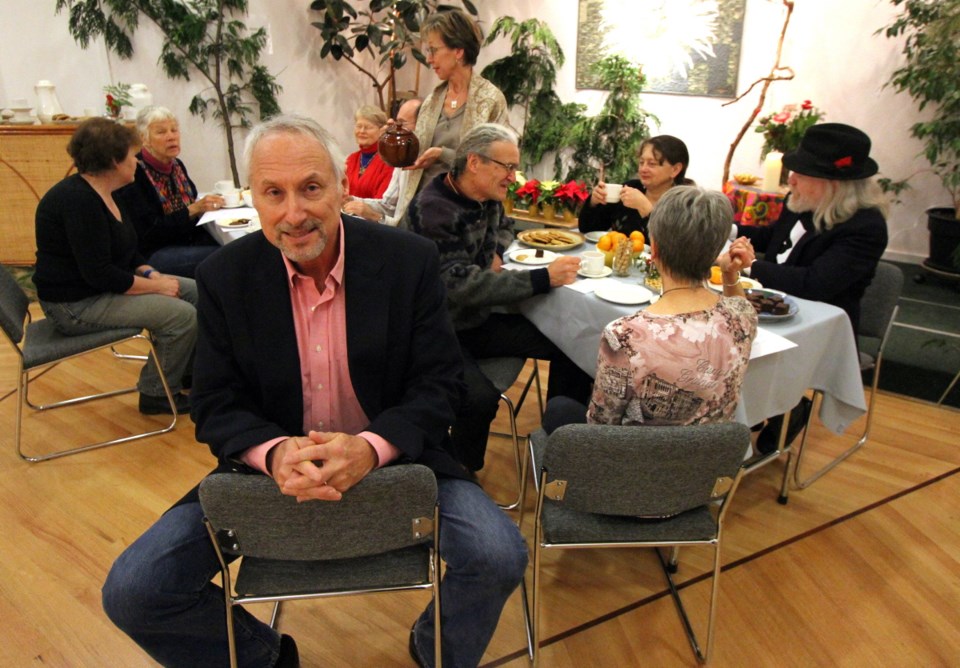The first entrée is consumed with the experience of loss. The second course includes sharing experiences and thoughts on the death of a significant other.
The conversation topics — or entrées — will change at each death café. But each event, held at Victoria’s Church of Truth as part of a global network of death cafés, shares the theme of mortality.
“It’s part of an international movement to stop disowning death by talking about it publicly,” said organizer Don Morris, who calls himself a death activist. “Just getting together and talking about life and death with different people is very liberating.”
London’s Jon Underwood began building a network of “death cafés” in 2011, modelling them on the “cafés mortels” pioneered by Swiss sociologist Bernard Crettaz. Cafés mortels and death cafés have been held in several cities around the world, from Paris and Lisbon to Columbus, Ohio, Tucson, Arizona, and Ann Arbor, Michigan. The first LGBT-specific death café was held in Ohio this September.
According to DeathCafe.com, the objective is “to increase awareness of death with a view to helping people make the most of their [finite] lives.”
Although expressions of grief are welcome, this is not a group counselling session, Morris said. It’s about sharing thoughts and experiences of death in a comfortable, confidential setting. Conversation at the non-denominational Church of Truth last week was punctuated with live musical performances of songs like Leonard Cohen’s Hallelujah. And participants were free to help themselves to tea, coffee and a potluck buffet.
“We work at making the atmosphere drop-dead special,” said Morris, who has dedicated his life to death since losing his father when he was five.
“I was protected from my own grief because of my particular background.”
He called his family Freudian — they believed children should be protected from negative feelings. The children did not attend their father’s funeral and were never asked how they felt.
It led him to spend 13 years as a funeral director in his 20s and 30s, as well as volunteering as a deputy coroner in Los Angeles, he said. Later, he trained as a hospital chaplain and worked as a psychotherapist specializing in grief-related issues.
“I’ve had a very interesting life, pursuing this,” he said. “Death keeps on waking me up to living. It’s quite the paradox between life and death; it’s beautiful.”
Morris also served as Canada’s first outreach director for the Green Burial Council of North America, which certified the Woodlands at Royal Oak Burial Park in Saanich as the first municipal green burial ground in the country.
Natural or green burial means human remains are returned to the earth to decompose naturally, without embalming, and wrapped in a shroud or placed in a fully biodegradable casket or alternative container.
More recently, he’s defining a new role for himself.
“My heart is really in supporting people at the end of their life and dying,” he said. “So I’m reinventing myself as an end-of-life coach.”
Participants, who were promised confidentiality from organizers, reported varied experiences.
“I really didn’t know what to expect,” said one woman. “It’s very interesting because in relating your thoughts, experiences — whatever — I think you’ll find many people are the same. It just doesn’t happen in social company. So this was lovely and easy.”
Another woman said the death café was a safe setting to explore upsetting feelings. She cried when she shared with her group her fears of losing a friend.
“I realized there was something that was bothering me. But in this very nurturing environment, I was able to speak about it.”
Participants were also invited to write any painful memory, emotion or thought that arose on a piece of paper. The papers were burned in a clay urn at the end of the discussions.
“So there’s this ritual of letting go through writing and burning this thing,” Morris said. “I’m trying to make it as healing as possible.”
The church plans to host monthly death cafés as part of its Oneness Wednesday series for the next six months. And the model is already spreading.
One attendee at last week’s event who heard of it for the first time that day said he now plans to replicate the model in Courtenay in the new year. Dale Presly is a hypnotherapist who hosts similar workshops as a volunteer with hospice.
“People are dying anyway, but we don’t often get together to discuss our shared experiences,” Presly said.
“I think that’s really what it’s all about, is sharing your experience and realizing you’re not alone. And when you know you’re not alone, the fear drops. And when the fear drops, then everything changes. That part, alone, is so gratifying to see.”
Morris also said that if there is enough demand, he would like to bring it to other venues around Victoria — from community centres to other churches and schools.
“My intuition tells me the culture is hungry for this,” he said.


